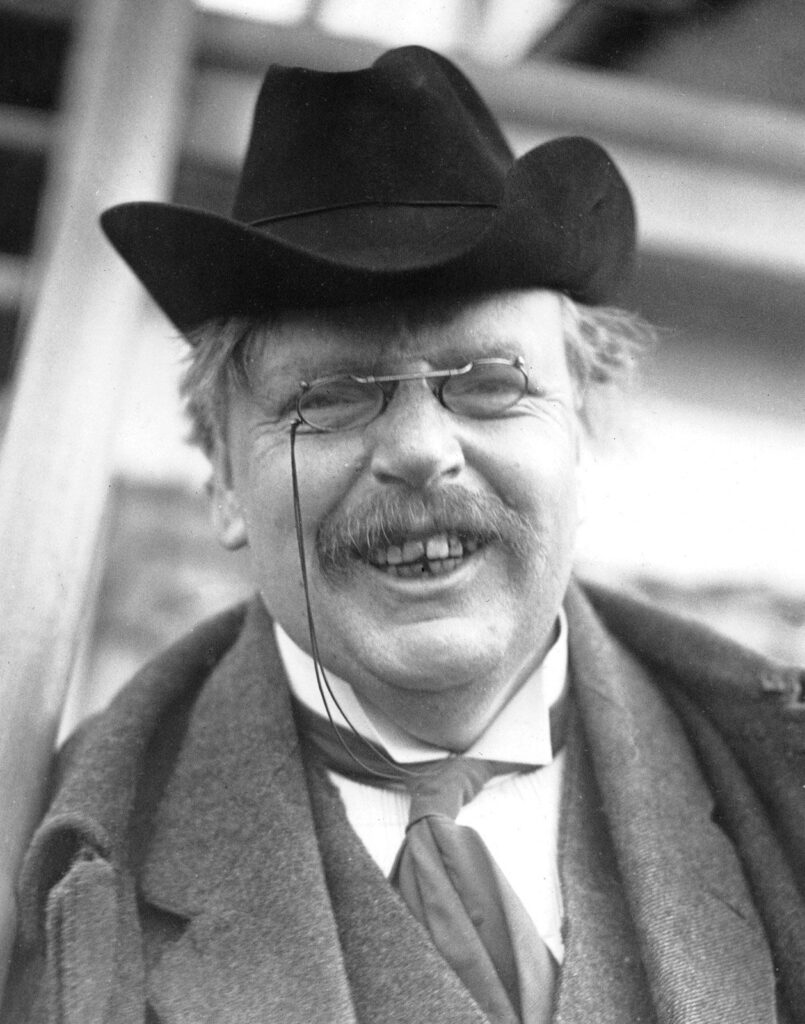
Here is a poem by GK Chesterton (1874-1936) in celebration of my father, Patrick Simpson Lambert (1924-2008), the most thoughtful man I have ever known, despite his human frailties. There were many learnings for me through his life that every day still evolve and build and teach. But the most important learning is that of empathy, understanding and stoic acceptance of life’s hard slings; a trait that he himself raged against as he slipped into his own gentle good night – he was an inveterate fumer metaphorically and practically, and his 40-a-day habit gave me the gift of being a happy life-long non-smoker. He was also a man of polymath interests, one of my first memories was of him building his own oscilloscope, with valves (this was the sixties), on the kitchen table. Later that day I tried to pick up his still-on soldering iron, at the hot end, resulting in me sprinting the three floors of the house in quite a lot of pain. And a stiff telling off from mum. For both dad and me. Dad’s day-job was as a veterinary surgeon, yielding tens of strays and pets through the childhoods of my three brothers and me. We even had a young owl for a while called Ollie, nurtured back to health and wild freedom once again, and fed on raw steak.
Chesterton was a larger-than-life character who would dominate any room he was in, and his six foot four stature and extensive girth added size and literal weight to his presence. Along with many others at the time Chesterton converted to Roman Catholicism later in life, at age 38, having been brought up in the Church of England. Though his family reportedly leant towards the Unitarian religious philosophy. Chesterton also became involved in the economic and political philosophy of Distributism, something that UK politicians of all persuasions might like to review and ponder.
My dad also converted to Catholicism in the 1950s, some years before I was born, following recovery from a breakdown caused by overwork and stress, together with his own obsessive over-thinking about existential meaning. He almost became a Buddhist but, walking past Saint Francis Catholic Church in the family hometown of Chester, decided to have a quick look inside, and became an immediate and lifelong convert. His own Damascene moment. I carry some of my dad’s thinking traits; one of my earliest questions to him, at age seven I think, whilst polishing my shoes in front of the kitchen fireplace before 9:30am Sunday Mass was “Dad, why is there something rather than nothing?” His response was suitably circumspect, knowing that I had to work that one out for myself1.

The first two stanzas below are Chesterton’s original words for The Convert. I have added two further verses in a similar but ever-imperfect poetic stye, with my own tilts and meanings. Chesterton’s words in the first verse recount the confusions of life and his epiphany of clarity and understanding 2. In the second verse Chesterton gives his take on the foolishness of the so-called sages and experts (Maybe Gove is on to something). And lines three and four (“They rattle reason through many a sieve…That stores the sand and lets the gold go free”) gives an excellent though almost certainly unintended visual metaphor and allusion to the barrenness of Scientific Reductionism, against what one might call ‘The Gestalt of Life’. His final two lines were, are and will be derided and scoffed at by many: “And all these things are less then dust to me…Because my name is Lazarus and I live”. But this mindset gave him the philosophical underpinnings for a rich and creatively happy life, so who can criticise?
The Convert Convert
After one moment when I bowed my head
And the whole world turned over and came upright,
And I came out where the old road shone white.
I walked the ways and heard what all men said,
Forests of tongues, like autumn leaves unshed
Being not unlovable, but strange and light;
Old riddles and new creeds, not in despite
But softly, as men smile about the dead.
The sages have a hundred maps to give
That trace their crawling cosmos like a tree,
They rattle reason out through many a sieve
That stores the sand and lets the gold go free;
And all these things are less than dust to me
Because my name is Lazarus and I live.
——————————
Through closed eyes I looked, cried and shook
Time’s arrow pierced my maw, carried to Hell’s red core
Day’s dawn tho’ broke me free of its Law
Birds and bees and sun and trees
Carried me up and out with the pink-curled breeze
A sinners’ sinner but original I saw
Space and Time and Matter must break. No Second Law
Hell’s call and day’s end I will not brook
High priestesses; sages just tinkers
Safe in wash-white towers. Dead in effect
Reduce, deduce, hidush
Publish hublish mublish. Such rubbish?
No: Expand, detect, error-correct
Bright new day, take away the blinkers, blessed be the thinkers.
———————————–
1 These days when asked the question I boringly start at Georg Cantor’s Set Theory and Number Theory. I really must get out more.
2 For the avoidance of doubt I am NOT talking about a God or Gods or an Intelligent Designer or an Intelligent Design (ID). The point is about coming to a oneness with one’s life and one’s own reality. I personally have no problem with the God Model or the Simulation Model (a variation on the God Model) or the Math-Physics-Neo-Darwinism Model, so long as their prothletites, lieutenants and henchwomen do not try and subjugate me. Or kill me. Or preach at me.